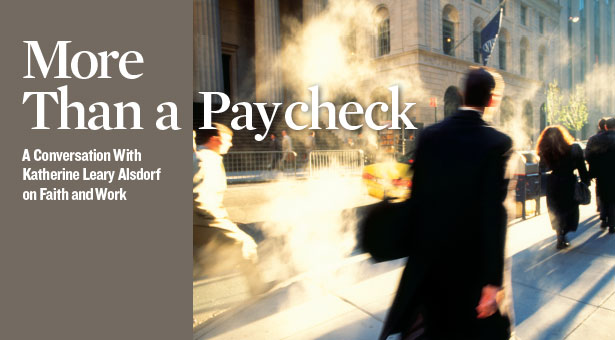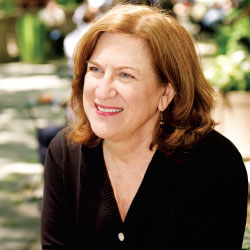
Interview by Nicole Miller
In 2001, Katherine Leary Alsdorf was out of work. The venture capital market had recently collapsed, taking with it the Silicon Valley startup where Alsdorf served as CEO. She was taking time, she says, to reflect on her calling — “If God calls you to lead a company, why does he let it fail?” — when she got a different kind of call from New York’s Redeemer Presbyterian Church.
The church, under the direction of Pastor Tim Keller, has been described by Christianity Today as “one of Manhattan's most vital congregations.” Thousands gather for its weekly services in three locations across the city and in the smaller churches it has planted in the New York metropolitan area.
Redeemer wanted to start a “marketplace ministry” to address the workplace needs of its urban congregation. And the church wanted Alsdorf 's help. “It wasn't anything I had ever thought of doing,” she says. “I wasn't very inclined to go work for a church.”
She’d spent 25 years in the high-tech industry in management, consulting, and marketing roles. She’d managed the sales and marketing division of a satellite television network in New York, where one of her employees — a member of Redeemer — invited her to church. It was at Redeemer, Alsdorf says, that she “said ‘uncle’ to God.”
Since then, she’d spent a decade considering what it means to be a Christian in the business world. At the time, she says, there wasn't much help from the church. “I complained a lot: If we’re supposed to be living as Christians in the workplace, couldn't the church help equip us to do that?”
Now Redeemer was asking her to help do just that. Alsdorf said “uncle” again and packed her bags.
Ten years later, Redeemer's Center for Faith and Work sponsors programs that reflect Alsdorf’s conviction that “we're supposed to be the church scattered in the world as much as we're to be the church gathered together on Sunday.” Vocation Groups provide a forum for industry-specific dialogue and collaboration; the Center’s Entrepreneurship Initiative provides entrepreneurs with mentorship and networking opportunities; the Arts Ministry helps artists explore their God-given creativity; the Gotham Fellowship offers a nine-month training program for young professionals to nurture individual spiritual development and equip these workers to serve the common good. Alsdorf, the Center’s executive director, spoke with Response about her faith and work.
What are the convictions about work or the workplace that inform your ministry at the Center for Faith and Work?
One thing I believe is that work is good. God made us to work. Even before I became a Christian, I watched colleagues who were passionate about what they did give their best to that work because they really believed in the work they were doing. I thought, “We were made to do this.”
Second, as I came to understand the gospel, it was clear that, as a leader in the workplace, I can’t be the model for goodness. Instead, I have to be the model of a repentant and redeemed sinner. This stands in stark contrast to what I sometimes heard in business circles, which was, “Here is a Christian leader who did everything right.” That’s just bad theology.
Third, I believe that God wants to use us to make our mark on culture. I worked in Silicon Valley for 10 years, and I watched Apple change the culture of the entire business world when it got rid of its dress code or introduced a new product. If a single organization can impact the culture of all of American industry, then it’s clear that culture can be shaped. As the leader of a company, I have the chance to shape the culture of an organization in a way that reflects what really matters to God.
 Katherine Leary Alsdorf
Katherine Leary Alsdorf
What does this kind of workplace transformation look like?
We start with the premise that the gospel changes everything. It certainly changes your motivation for work. As the leader of an organization, are you leading to make a name for yourself, or are you leading to serve? How is your product or company going to contribute to human flourishing? Even if you’re at the very bottom of the totem pole in the organization, it’s important to have some idea of the thing that you’re contributing in the world.
The gospel also changes the relationships you’re in. In a business context, you’re in a relationship with your employees, your customers, your suppliers. The gospel changes how you handle conflict so that you can address conflict in a way that honors the other person and provides for resolution. The gospel changes the way you view your power or lack of power in an organization, so that you use power not for yourself, but as a steward on behalf of others.
And the gospel changes the culture or the world that you operate in, whether that's the culture of a particular firm or industry or the culture of society at large.
So this is our framework at Redeemer: We believe that the gospel can change your heart, your community, and the world around you.
How do you help facilitate this transformation?
We get people together by vocation to get them talking about their industry and the kinds of questions they have, and the kinds of solutions they’ve figured out for themselves; to prod and provoke each other into thinking more deeply; to equip them to shape the entire organization and their products in a way that's gospel-centered or in light of the gospel. It’s an incubator or a laboratory that helps you practice a Christian approach to leadership in the safe environment of the church, so that when you go out into the tougher environment of the world, you can be better prepared to lead in a God-glorifying way.
You came to Redeemer after a period of unemployment. What's your advice on navigating these moments of transition in our work life?
I define work to be far broader than the work that brings you a paycheck. I’ve been unemployed a number of times in my life, once for over a year. It was really important that I find work that I could do even though it didn’t bring a paycheck. Sometimes it was housework, sometimes it was serving in the church — but to use my gifts for productive work was really important to my sanity during that time.
We run a program through our church for people out of work. One of the first things we say is, “Make sure you find work for yourself.” There’s something that you're doing that uses your gifts so that you’re experiencing God's pleasure as you work. It fills you up to be able to do that.
What is the link between work and the meaning or sense of identity we draw from it?
I’m sure we’re not the first generation to struggle with this, but it does seem that we work more for the identity we think it gives us than we do for the enjoyment of the work itself. As I’ve said, the gospel ought to change our motivations.
I think there are some pockets of the identity issue that are really bad right now. For women, in particular, it’s really hard to navigate being a wife, a mother, and a worker, because, as a culture, we ground our identity in our professional life. It’s hard for women to have a full life if they're afraid to sacrifice the career to pursue a relationship or motherhood. I don't think that’s healthy culturally. In order to be fully human, you need to open yourself to all God has to offer us, not just to some portion of it.
As Christians, how do we make ethical decisions in the workplace?
I think the important idea here is that we're like Daniel in Babylon. We’re in an environment that doesn’t share all of our values; to do the right thing or the best thing, you often have to be the only one doing it. You have to think through it on your own when it’s really gray.
Someone might say, “I don't think it's ethical to work for a cigarette company,” or, “I don't think it’s ethical to work for a gun manufacturing company.” In our ministry, we're not going to offer you a list of rules. We’re going to try to help you think about your motivations. Wisdom is different from following the rules. Wisdom requires going to God for discernment.
We get a lot of questions like, “I believe in Jesus, but how’s that supposed to help me right now?” or “What are the resources of our faith to help us in times of decisionmaking or struggle?”
How do you answer those questions?
I usually say things like, “The Holy Spirit is extremely powerful and ever-present, but it really would help to build a relationship with God on a day-to-day basis, not just in your moment of need.”
